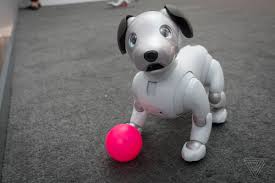Robot Dogs
December 23, 2020

In 2018 a woman tried to board a plane at Newark International Airport with her emotional support animal—a peacock. That didn’t fly; well, neither of them flew that day. Still, the term “emotional support animal” has been exploited by travelers attempting to transport a variety of animals in the not-so-friendly skies, including pigs, turkeys, squirrels, baby kangaroos, and miniature horses.
The skies became even less friendly to this trend when the federal government recently limited pets on flights to dogs, giving the struggling airline industry a bit of good news in an otherwise devastating year.
But what if the kangaroo was a robot?
Let’s not get ahead of ourselves. If we’re considering robot support “animals,” we’ll have to settle for dogs for the time being.
That’s the consensus from a group of researchers at the University of Portsmouth. In a new study, published in the International Journal of Social Robotics, first author Olivia Barber and colleagues argue that robotic dogs could soon replace real canines as emotional support animals—and will likely have an easier time and get fewer malicious stares when boarding planes.
The team brought two real dogs—a Jack Russell-Poodle mix and a Labrador retriever—alongside a biomimetic dog to visit a group of 34 children in West Sussex. The 11- and 12-year-olds had two sessions, one with the real-life canines, and a second with the robot, which was developed by Consequential Robotics. While the kids stroked animals equally, they actually interacted with the robot more.
Study supervisor, Dr Leanne Proops, knows the emotional impact that real dogs have on children and adults alike. Yet many people suffer from allergies, while others are on high alert for diseases transmitted across species. There’s also liability concerns; lawsuits over biting dogs happen. And, of course, the expense of animals is prohibitive to some. Robots could fill a void.
“This preliminary study has found that biomimetic robots — robots that mimic animal behaviours — may be a suitable replacement in certain situations and there are some benefits to using them over a real dog.”
Move over Animal Assisted Interventions. Welcome to Robot Assisted Interventions.
As the authors note, robot pets already exist. A robotic seal named Paro is designed to keep seniors company. Social robots help stroke victims during rehabilitation and have proven useful in communicating with autistic children.
Despite the fascination, this story doesn’t end like the film “Her.” The pre-teens preferred the real animals, not the metal imposter. That said, the more time they spent with the robot, the fonder they became of him. The team chose dogs for this pilot study given their ubiquity and our longstanding positive relationship with them.
As part of the study, each participant filled out a questionnaire about their biophilic beliefs. Interestingly, animistic beliefs played a role—how willing they were to ascribe agency to the robot. The “realer” the robot felt, the more positive the affect.
Moving forward, robot support animals could help people unable to care for or be around actual animals. As Proops concludes,
“This is a small-scale study, but the results show that interactive robotic animals could be used as a good comparison to live dogs in research, and a useful alternative to traditional animal therapy.”
Register your Dog Schedule a Visit

 When middle school students return to class on Jan. 11, they’ll find a new face at the door: Daisy. Daisy is a therapy dog and the personal pet of Rob Kreger, principal of the Rock L. Butler Middle School. The five-year-old golden retriever is not a school pet or mascot, but rather a working dog […]
When middle school students return to class on Jan. 11, they’ll find a new face at the door: Daisy. Daisy is a therapy dog and the personal pet of Rob Kreger, principal of the Rock L. Butler Middle School. The five-year-old golden retriever is not a school pet or mascot, but rather a working dog […] Last March, Caroline Benzel, a third-year medical student, began to notice the stress and discomfort her nurse friends were feeling from the pressures of the ongoing Covid-19 pandemic. “[Personal protective equipment] can be really rough on the skin,” Benzel, 31, tells PEOPLE. Benzel and her 3-year-old Rottweiler, Loki (who’s also a therapy dog) hatched a […]
Last March, Caroline Benzel, a third-year medical student, began to notice the stress and discomfort her nurse friends were feeling from the pressures of the ongoing Covid-19 pandemic. “[Personal protective equipment] can be really rough on the skin,” Benzel, 31, tells PEOPLE. Benzel and her 3-year-old Rottweiler, Loki (who’s also a therapy dog) hatched a […] When Stanley the miniature fox terrier’s owner passed away, the little dog started a ‘paw-some’ new role – bringing puppy love to some of the Gold Coast’s oldest residents. After Carinity Cedarbrook Diversional Therapist Julianne Staff adopted Stanley, he began visiting the aged care community at Mudgeeraba as a therapy dog. Therapy dogs help to […]
When Stanley the miniature fox terrier’s owner passed away, the little dog started a ‘paw-some’ new role – bringing puppy love to some of the Gold Coast’s oldest residents. After Carinity Cedarbrook Diversional Therapist Julianne Staff adopted Stanley, he began visiting the aged care community at Mudgeeraba as a therapy dog. Therapy dogs help to […] Those who own a dog can attest to their ability to lift mood, improve stress and bring joy by simply being there, unanswering, seemingly all-knowing and always delighted to see you. Therapy animals are known for their calm and comforting nature, giving people a way to relax, de-stress and interact with a loving pet. They […]
Those who own a dog can attest to their ability to lift mood, improve stress and bring joy by simply being there, unanswering, seemingly all-knowing and always delighted to see you. Therapy animals are known for their calm and comforting nature, giving people a way to relax, de-stress and interact with a loving pet. They […] For those of us with dogs, we know they quickly become major parts of the family. You live for and care for just like one of your own children, and one dog right here in Oklahoma City is beating the odds, and helping others recover as a therapy dog, despite all of the issues he’s […]
For those of us with dogs, we know they quickly become major parts of the family. You live for and care for just like one of your own children, and one dog right here in Oklahoma City is beating the odds, and helping others recover as a therapy dog, despite all of the issues he’s […] Cherokee Middle School students may do a little more “doodling” second semester starting this month (January), but also will improve their attendance marks because of a special attraction at the school, courtesy of Principal Scott Aden. Aden, an effective, caring administrator, has acquired and will house and handle a young female Golden Doodle (Charlie) that […]
Cherokee Middle School students may do a little more “doodling” second semester starting this month (January), but also will improve their attendance marks because of a special attraction at the school, courtesy of Principal Scott Aden. Aden, an effective, caring administrator, has acquired and will house and handle a young female Golden Doodle (Charlie) that […] E5 Therapy opened in April with a different way to help veterans in therapy. They offer canine-assisted therapy along with talk therapy to veterans and veterans’ families in Solano County. Owner Matthew Decker is a licensed clinical social worker in Northern California, focused on helping veterans achieve their mental health goals. Along with his team, […]
E5 Therapy opened in April with a different way to help veterans in therapy. They offer canine-assisted therapy along with talk therapy to veterans and veterans’ families in Solano County. Owner Matthew Decker is a licensed clinical social worker in Northern California, focused on helping veterans achieve their mental health goals. Along with his team, […]